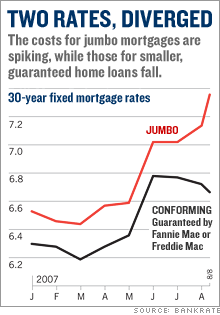Housing woes hit high end tooThe subprime mortgage collapse isn't just threatening the market for low-end homes; it's also afflicting luxury homes, reports Fortune's Jon Birger.(Fortune Magazine) -- What could the collapse in the subprime mortgage market possibly have to do with whether Dr. Jeffrey and Madeline Stier get full price for their four-bedroom house in the wealthy New York City suburb of Larchmont? Not much, you would think. After all, the people who live in Larchmont tend to be lawyers, doctors, and Wall Streeters. Generally speaking, they aren't the credit-challenged borrowers who must resort to subprime mortgages to finance their homes.
 
And yet talk to the Stiers about the tepid demand for their home -- a lovely Tudor on a tree-canopied cul-de-sac near the local elementary school -- and it's clear that what's happening in the subprime market is reverberating all the way up the real estate food chain. Not only has the collapse driven up rates on many kinds of mortgages, but fear of a stock crash -- one perhaps sparked by the bursting of the credit bubble -- has for now prompted many high-end homebuyers to either trim their offers or stop shopping altogether. "It's the hysteria on Wall Street," Jeffrey Stier says. "It's frightening people." The timing has been unfortunate for the Stiers. Their house, which they've owned for 30 years, boasts a stylish outdoor pool, a modern kitchen, and a nicely renovated master bathroom. Given its location and amenities, it probably would have sparked a bidding war had it been put up for sale a year ago. But today, six months after the Stiers first listed it for sale at $2.5 million -- a price only slightly above what comparable homes had been selling for -- the house remains unsold. Tired of waiting, the Stiers finally capitulated and recently dropped their asking price to $1.99 million. The market's psychology has changed more than the fundamentals, argues Phyllis Radding, a veteran Coldwell Banker agent who is selling the Stiers' home. "All the negative articles in the press have made buyers more cautious," she asserts. Psychology does seem to be darkening the high-end market. But it's more than just fear. A recent spike in rates on so-called jumbo mortgages is raising the cost of buying an expensive home. The combined effect of psychology and higher rates is simple but brutal: A theoretical buyer is likely to offer you less -- maybe 10% to 15% less -- than he might have just one month ago. The jumbos are probably a bigger impediment than fear. The term refers to home loans in excess of $417,000. By rule, they cannot be guaranteed by the government-sponsored mortgage finance companies Fannie Mae and Freddie Mac. Of late, if Fannie or Freddie aren't vouching for your loan, there's trouble. As with most mortgages, jumbos are typically bundled together by lenders and then resold to investors (often mutual or pension funds) as mortgage-backed securities. The problem: The rising number of defaults on subprime mortgages -- particularly among borrowers who took out interest-only or other exotic loans -- has laid bare the, um, less than diligent practices of many lenders. That has spooked investors and dried up the secondary market for mortgages -- even those of sterling quality -- that aren't guaranteed by Fannie or Freddie. Unable to resell their jumbo mortgages on Wall Street, lenders are now making far fewer mega-loans, and those they are making charge much more onerous interest. For years jumbo rates were only 0.25 of a percentage point above those of "conforming" loans -- those below the cutoff (now $417,000). In recent weeks that spread has exploded to 0.75 of a percentage point or more. BankRate.com reports that the average tariff on jumbo loans soared to 7.35% nationally in August, and many mortgage brokers are reporting figures that exceed 8%. Increased rates on big home loans translate to a substantial decline in buying power. Two years ago a $6,000 monthly payment would support a $1 million, 30-year mortgage at 6%. Today that same $6,000 payment covers only an $870,000 mortgage at 7.35%. In other words, higher rates have trimmed the buying power of luxury-home buyers by 10% to 15%. Throw in the fact that some buyers can't get a mortgage at any rate right now, and you've got all the makings for a national price correction for luxury homes. "Eventually it's going to take its toll on the higher end of the market," says Karl Case, a Wellesley College economics professor and a co-founder of real estate consulting firm Fiserv CSW. The only question is whether sellers will hold out -- which they're prone to do when the economy is strong. For example, the Stiers, who are empty nesters looking to downsize, say they'd rather stay put than go below their revised asking price. Those inflated numbers on oversized home loans may be here to stay for at least a year. One top mortgage fund manager says he's sworn off investing in jumbos because he doesn't trust the rating agencies to distinguish the good credit from the bad. "I just don't see the light at the end of the tunnel," the fund manager says. The jumbo mortgage woes will probably have a national effect on real estate. Up to now, the slowdown has been quite localized. Areas like metropolitan New York had been exempt, while parts of California and Florida were notoriously affected. According to the second-quarter survey of the National Association of Realtors, home prices are now falling in many once-hot areas such as Sacramento (6% year-to-year decline) and Tampa-St. Petersburg (down 4%). The Las Vegas market, once more scorching than the desert sun, has cooled. Those regional slowdowns are a byproduct of the oversupply created during the bubble years -- basically too many speculators looking to make a quick buck and too many developers and lenders willing to help them try. It's a story that has been told endlessly, yet contrary to popular belief, rampant speculation was never a national phenomenon. The same can be said about the fallout from that speculation. The NAR data show second-quarter home price increases in 97 of the 149 metropolitan areas surveyed. Some of the better markets include Salt Lake City (up 22%), Seattle (up 9%), and Charlotte (up 8%). Until now sellers like the Stiers could take comfort in the fact that what was happening in Vegas was staying in Vegas. And there is little precedent for a real estate downturn occurring in the absence of an economic one. But the woes of the mortgage market are now threatening to metastasize, and the segment most at risk is luxury homes. The shakeout has already begun, maintains Diane Saatchi, a real estate agent who specializes in multimillion-dollar vacation homes. The head of the East Hampton, N.Y., office of the Corcoran Group, Saatchi says it's no coincidence that several of her sellers agreed to lop hundreds of thousands of dollars off their asking prices the same week that jumbo rates pushed past 7%. She's now predicting a 20% price decline for all but the most expensive Hamptons homes (the superrich don't care about mortgages). Says Saatchi: "More and more, this feels like a correction." Feedback: Do you think we're headed for correction? Or is the worst over? |
|



